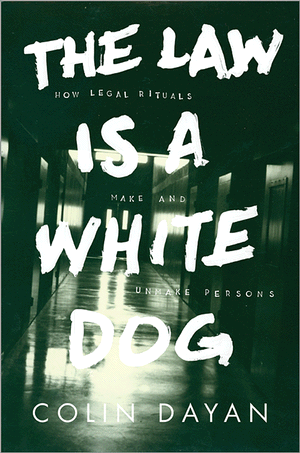 Princeton University Press has announced the release of The Law Is a White Dog: How Legal Rituals Make and Unmake Persons, by Colin Dayan (Vanderbilt University).
Princeton University Press has announced the release of The Law Is a White Dog: How Legal Rituals Make and Unmake Persons, by Colin Dayan (Vanderbilt University).The Press describes the book as follows:
Here are a few of the blurbs:Abused dogs, prisoners tortured in Guantánamo and supermax facilities, or slaves killed by the state--all are deprived of personhood through legal acts. Such deprivations have recurred throughout history, and the law sustains these terrors and banishments even as it upholds the civil order. Examining such troubling cases, The Law Is a White Dog tackles key societal questions: How does the law construct our identities? How do its rules and sanctions make or unmake persons? And how do the supposedly rational claims of the law define marginal entities, both natural and supernatural, including ghosts, dogs, slaves, terrorist suspects, and felons? Reading the language, allusions, and symbols of legal discourse, and bridging distinctions between the human and nonhuman, Colin Dayan looks at how the law disfigures individuals and animals, and how slavery, punishment, and torture create unforeseen effects in our daily lives.
Moving seamlessly across genres and disciplines, Dayan considers legal practices and spiritual beliefs from medieval England, the North American colonies, and the Caribbean that have survived in our legal discourse, and she explores the civil deaths of felons and slaves through lawful repression. Tracing the legacy of slavery in the United States in the structures of the contemporary American prison system and in the administrative detention of ghostly supermax facilities, she also demonstrates how contemporary jurisprudence regarding cruel and unusual punishment prepared the way for abuses in Abu Ghraib and Guantánamo.
Using conventional historical and legal sources to answer unconventional questions, The Law Is a White Dog illuminates stark truths about civil society's ability to marginalize, exclude, and dehumanize.
The TOC and a sample chapter are available here."Colin Dayan's engagement with what she calls the sorcery of the law leads her to trouble narrative movements from ignorance to knowledge, animality to humanity, barbarism to enlightenment, slavery to freedom. In the process she urges us to recognize how legal technologies that once sustained a core contradiction of slavery--that slaves were only accorded legal personality when they committed a crime--now relegate millions of incarcerated persons to civil death. The Law is a White Dog compels us to acknowledge how the ghosts of slavery continue to animate institutions--from Guantanamo to the supermax--that thrive on racialized violence today."--Angela Y. Davis, professor emerita, University of California, Santa Cruz
"This is truly an extraordinary book, one which will become a classic of interdisciplinary legal scholarship. Combining memoir, literary criticism, history, cultural studies, and analysis of legal doctrine, this is a fascinating tour de force."--Austin Sarat, Amherst College
Hat tip: Bookforum